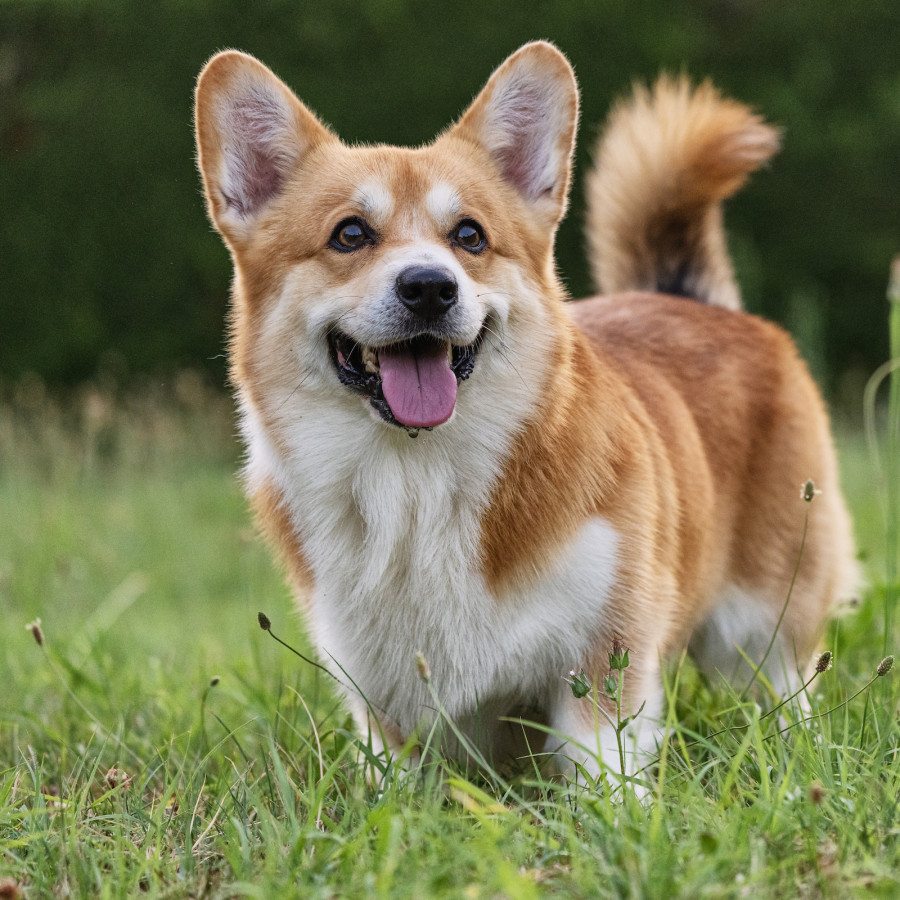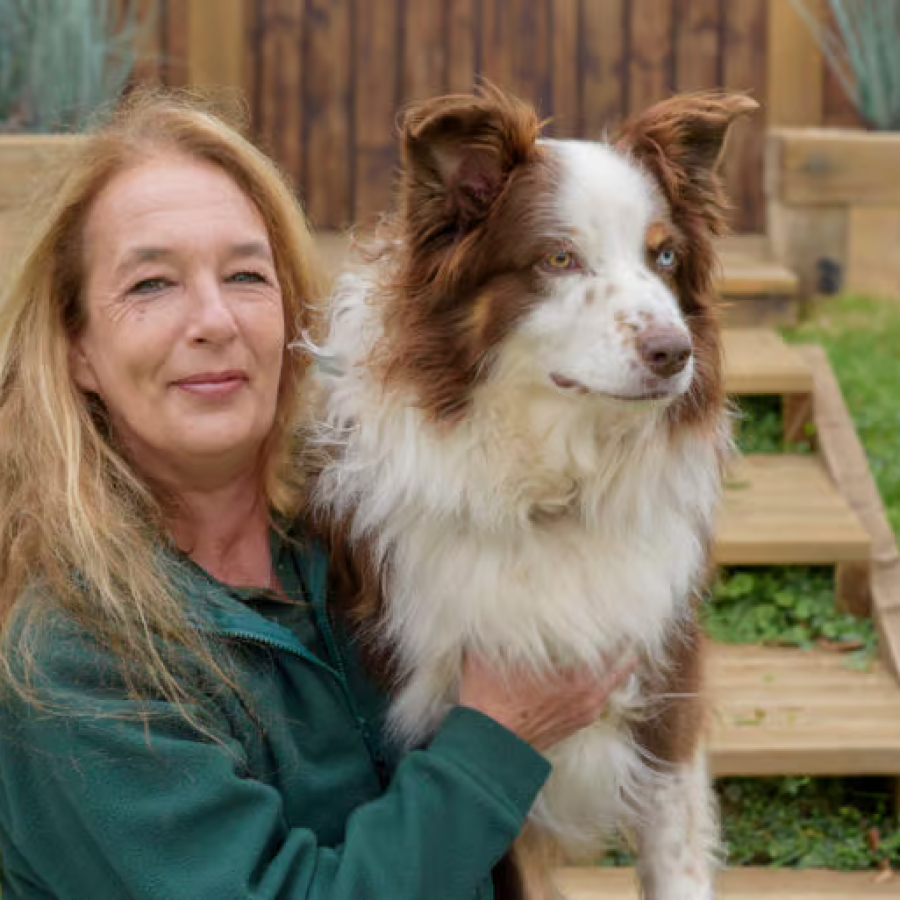
Pembroke Welsh Corgi Dog Breed
Pembrokes are larger-than-life little dogs that love to be vocal and keep active.

Pembrokes are larger-than-life little dogs that love to be vocal and keep active.
Breeds like this may have extreme body conformation, which means exaggerated body features, or a flat face and shorter nose (brachycephalic). These characteristics can negatively affect their health and welfare, and you may face higher insurance and veterinary costs.
If you have your heart set on this breed, please consider rescuing a dog in need rather than buying a puppy.
The Pembroke Welsh Corgi (although similar not the same as his cousin the Cardigan Corgi) is often referred to as just ‘Pembrokes’. This short-legged herding breed has a long history of moving cattle via a sharp nip on their ankles and alerting farmers to the presence of predators or intruders. They’re an active little dog with plenty of energy. You’ll certainly be kept on your toes and comes with royal approval thanks to the adoration the late Queen had for them.
Pembrokes are playful, outgoing, friendly, bold, and protective. They were bred to work for farmers, so they’re extremely energetic with lots of stamina. The best time to train Pembrokes is when they’re young as they’re known to become stubborn as they mature.
Regular exercise is a must as this breed loves to run around and play games that involve chasing toys. They also make good watchdogs but do tend to bark at anything that catches their attention or seems strange.
Disclaimer
While these breed traits give a general idea of what to expect from a specific type of dog, it's important to remember that every dog is unique. Just like people, each dog comes with their own distinct personality, quirks, and characteristics!

Pembrokes make good family dogs for those with older children. They’re bossy by nature and with their instincts to control herds of cattle, children are likely to receive a nip at the ankles if they’re running around all over the place. This is just a Pembrokes’ way of getting them under control. If you’re an outdoorsy family who loves to get out and about, a Corgi will love joining you! They need plenty of physical and mental exercise.
Yes! Corgis love to play, it’s something they need to do every day to be happy. In the absence of cattle, chasing and grabbing their toys satisfies their natural desire to keep things in order. They’re an incredibly active breed and playtime is a great way for them to work their bodies and minds.
Oh yes, are they ever! Pembrokes are vocal herders, so it makes sense why they take this trait into home environments. They bark when they are excited, frustrated or alarmed.
As well as herding cattle, they were also used as watchdogs on farms, so they’ll certainly be on their guard in the home. This means they’ll bark at pretty much anything that dares move, like people, birds, neighbouring cats, and anything else they think you’d want to know about.
Their bark is high-pitched, so hearing this over and over could affect those with sensitive hearing. For this reason, Pembrokes may not be the right choice if you live in a flat.
Excessive barking can be a bit of a problem with Pembrokes. Like with all dogs, a bit of barking is to be expected, however, nuisance barking is annoying for owners and surrounding neighbours too.
Some Pembrokes have a strong herding drive and when they do, they tend to nip ankles. Luckily, this can be prevented with appropriate outlets for them.
Their loyal and affectionate nature can lead to separation-related issues if they’re not taught how to cope with being home alone.
A Pembroke Welsh Corgi needs a home where they can be part of the family and children old enough to respect their needs and get involved in training.
They need access to a garden and live within walking distance to open, green spaces where they can run and play at least twice a day.
If well socialised well, Pembrokes can live with other pets in the home, it’s easy to introduce them into the household when they’re a puppy, rather than opening the home to a new pet when you have an adult Pembroke.
They don’t suit flats or apartments because of their noisy barking, and they need their time spent home alone kept to a minimum. They much prefer someone home to keep them company all day.
Pembrokes need at least two good walks a day, as well as a suitable way to express their natural behaviour. They need lots of time dedicated to playing games involving chasing toys and grabbing them. They are a bright working breed, so mental exercise is essential. Basic training, learning new tricks and using puzzle feeders will also help them release their built-up energy.
All puppies need to learn how to be around people, pets, and other dogs, calmly and politely (known as socialisation). They also need help to feel calm, comfortable, and confident in everyday situations like travelling, the sound of traffic, and being in busy places (known as habituation). This is essential to prevent tricky behavioural problems in the future, and you'll be off to a great start with your ongoing training.
Pembrokes are easy to train when they’re young, they’re willing to learn and eager to please at this age, so make the most of puppyhood!
This active breed always wants to be doing something; they’re fast and agile making them great dogs for sports like hoopers and agility. Adolescence is a challenging time for both dogs and humans. For Pembrokes, this is where their bossiness and stubborn personalities can appear. Keep going with their training and you will reap the rewards.
For your Pembroke to enjoy time off-lead, they need to learn how to come back to you when they’re called. This is called ‘recall’ and is vital in open areas where there might be joggers or cyclists about.
Pembroke Welsh Corgis are moderate to heavy shedders. They have a double coat, so regular grooming will help them feel more comfortable in warmer weather while reducing the amount of hair sticking to your carpets, sofa and clothes!
A slicker brush and a rake are all you need to keep their coats in tip-top condition.
Regular grooming sessions will also give you the opportunity to check for any lumps, bumps, cuts, grass seeds and parasites.
Unfortunately, Pembrokes are at risk from several genetic health disorders. If this breed is the top dog on your list, the best thing to do is buy from a reputable breeder who health screens the dogs they breed from.
Pembrokes can be affected by both hip and elbow dysplasia, eye disorders, heart problems, Degenerative Myelopathy (a disease that affects the spinal cord, causing progressive muscle weakness and loss of coordination) and Von Willebrand's disease (a blood clotting disorder).
This stocky little breed is also prone to excessive weight gain, but this is something an owner has complete control over, and there are lots of ways of keeping them in shape.
I like to walk and chase my toys, so as long as you take me out twice a day, I’ll be happy! This will give me mental and physical stimulation.
I’m very smart but I need the extra motivation to work my mind. I love food, so puzzle feeders are great fun for me, and playing with my toys!
I love to get involved in activities that allow me to move my body like hoopers and agility. It helps keep me mentally and physically healthy.
For a Pembroke puppy that’s come from a parent that’s been fully health tested by the breeder, you can expect to pay in the region of £1,200 to £2,500.
Not to mention all the items you need to buy to keep your new four-legged friend happy and healthy. The set-up cost includes things like food, bowls, toys, collar, lead, harness, bed, bedding, puppy pen and baby gate, which can set you back several hundreds of pounds.
Then there are the ongoing costs like food, pet insurance, vaccinations, and parasite control.
Take our quiz to discover which breed is right for you
Take our quizPlease call our pet support line on 0300 303 9333 (7 days a week – 8.30am - 4pm)